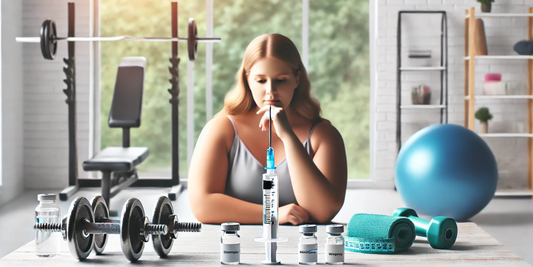Manopause fact or fiction?
The andropause, commonly referred to as 'manopause': is it a real phenomenon or are men just getting on the bandwagon of hormone replacement?
It is certainly true that hormone levels in men, in particular testosterone, do decrease with.
Men experience a gradual decline in testosterone levels by about 1% per year, starting around age 30. This means the drop by around 20% by the age of 50. However, this is a slow, insidious decrease rather than the sudden change that happens to women in the menopause.
That is not to say it is unimportant. In fact, this slow slide means that due to the slow nature of the changes many men are unaware it is even happening.
This drop can significantly affect energy, libido, and athletic performance. It also has a significant impact on mood and motivation not to mention cholesterol, muscle and bone density. All of which will have an impact on longevity and how well someone ages.
Rethinking Testosterone Replacement
Now, before you go jumping straight to testosterone replacement therapy (TRT), you should be aware that, if managed properly, it is nearly always possible to optimise your testosterone without having to take hormone replacement.
Before considering TRT you should make sure to educate yourself to the issues involved with TRT.
Why? Well, when you have external testosterone, it feeds back to your body, telling it it is producing enough.
That can lead to your body reducing its natural production and shrinking the testes, as exogenous testosterone (like gels) signals that enough is being produced. To prevent this, synthetic GnRH injections are then recommended alongside replacement therapy – it's not a simple solution.
It also means you might well be stuck on taking it long-term, making it difficult to wean yourself off it. But there are other very practical options. As always, you should look at lifestyle first.
Boosting Testosterone Naturally
Testosterone gets converted to oestrogen in some circumstances by an enzyme called aromatase. If aromatase is overactive, rebalancing it is a great natural way to reduce the effects of oestrogen and to boost testosterone.

Lifestyle Adjustments
- Alcohol Moderation: be mindful of your alcohol intake. Excessive drinking boosts aromatase activity in fat tissue, converting testosterone to oestrogen and damaging testosterone-producing cells. It also increases prolactin (which decreases testosterone and increases male breast tissue) and increases SHBG, which can lead to less free active testosterone.
- Plastic Awareness: avoid BPA and parabens found in plastics, as they mimic oestrogen and disrupt hormonal balance. If you drink bottled water make sure it is glass not plastic. If you are reheating or storing food make sure it is in glass containers.
- Sleep Well: quality sleep is crucial for maintaining testosterone levels. Mouth breathing at night is linked to lower testosterone. If you are a mouth breather you can even tape your mouth closed.
- Weight Management: testosterone can be converted to oestrogen. The enzyme that does this is called aromatase. Aromatase is present in fat cells so the more fat you carry the more aromatase you have. That excess fat increases oestrogen levels, reducing testosterone.
- Exercise Right: target large muscle groups to boost testosterone, but avoid overtraining, which can deplete it.
- Stress Management: chronic stress leads to 'cortisol steal,' where resources are diverted to produce cortisol at the expense of testosterone. High levels of cortisol suppresses testosterone production and increases prolactin.
Advanced Testing for Testosterone
Understanding testosterone levels requires more than just the measurement of total testosterone.
If your testosterone is low, you want to know why. Is the production messenger (LH and FSH) not strong enough? Is overall production too low? Is the active testosterone being reduced by too much binding protein (SHBG)? Or is prolactin too high and therefore inhibiting release? Proper testing, looking at a range of biomarkers, allows for more successful management of testosterone.
When we were putting together our advanced male hormone test we wanted to offer a comprehensive assessment that allows you to understand what is really going, including:
- Free Androgen Index (FAI): indicates the amount of active testosterone.
- SHBG and Albumin Levels: these proteins bind to testosterone, affecting its availability.
- LH and FSH: hormones that signal the testes to produce testosterone.
- Prolactin: can negatively impact the function of the testes in producing testosterone.
- Free testosterone
Biohacking naturally with Supplements to Boost Testosterone
Boosting testosterone naturally through lifestyle hacks can be augmented with minerals, vitamins and natural phytopharmaceutical compounds. Several supplements stand out for their unique roles in hormonal health. These supplements, grounded in scientific research, offer a holistic approach to enhancing testosterone production and ensuring hormonal balance.
Unlike testosterone replacement they encourage the body to produce more testosterone, which has positive rather than negative feedback.
Fadogia Agrestis: A Natural LH Booster
Fadogia Agrestis increases LH secretion from the pituitary gland. This action is crucial because it directly encourages the Leydig cells within the testes to ramp up testosterone production.
Tongkat Ali: Unlocking Free Testosterone
Tongkat Ali steps into the hormonal dance by freeing testosterone from its binding proteins, making more active testosterone available for use by the body. Its influence extends to lowering cortisol levels, which not only improves the testosterone-to-cortisol ratio but also aids in recovery and muscle development. High levels of cortisol suppress the production of sex hormones such as testosterone sometimes referred to as "cortisol steal".
Boron: Enhancing Testosterone Bioavailability
Boron intricately influences steroid hormone metabolism, notably aiding in the conversion of total testosterone to its free, more active form. This is achieved by diminishing SHBG levels and also by interacting with vitamin D and oestrogen metabolism, indirectly fostering testosterone levels.
Vitamin D3 and K2: Synergistic Support for Testosterone
Vitamin D3, acting hormone-like, has a direct relationship with testosterone levels, especially in enhancing Leydig cells' capacity to produce testosterone. Vitamin K2 complements D3 by promoting testosterone synthesis and optimising calcium metabolism, essential for muscle function and overall health.
Low vitamin D3 is strongly linked to lower testosterone levels. Normalising vitamin D can help to boost testosterone. However, if you have normal vitamin D levels increasing these further will not further enhance testosterone.
DIM (Diindolylmethane): Balancing Hormones
Testosterone is converted to oestrogen in both men and women by aromatase enzymes (aromatisation). DIM shines in its ability to fine-tune oestrogen metabolism, promoting a more favourable balance between testosterone and oestrogen. By suppressing this conversion and aiding the detoxification and removal of excess oestrogen, DIM optimises the testosterone-to-oestrogen ratio, mitigating oestrogen dominance's undesirable effects like increased body fat and water retention.
Zinc: A Cornerstone for Testosterone Synthesis
Zinc’s role is twofold: it facilitates the enzymatic conversion of cholesterol to testosterone and prompts the pituitary gland to release LH, a direct stimulant for testosterone production. In men, it is also essential for prostate health and plays an important role in a normal immune response.
Magnesium Glycinate: Enzymatic Support for Testosterone
Magnesium is pivotal for numerous enzymatic processes, including those vital for testosterone production. Its role in reducing SHBG levels further amplifies the amount of free testosterone, enhancing enzymatic activity necessary for hormonal health and mitigating muscle fatigue for improved physical performance.
Selenium: Protector of Leydig Cells
Selenium's antioxidant properties shield Leydig cells from oxidative harm, supporting their crucial role in testosterone production. Its influence on thyroid hormone metabolism also plays into the broader picture of hormonal balance, impacting energy levels and mood.
T-Vital natural testosterone support - pure tongkat, fadogia, boron
At humanpeople, we have formulated a potent natural testosterone boosting supplement that contains 400mg Faogia agrestis, 600mg of tongkat ali and 2mg of Boron.
Comprehensive testosterone stack including T-Vital
This stack includes the T-Vital supplement, Vitamin D3 & K2, DIM, Magnesium Glycinate, and Zinc & Selenium. If you are already taking Vitamin D3 we do recommend taking this out of the stack as 4000IU of vitamin D3 is the optimal level.
Prolactin and its impact on Testosterone, dopamine, libido, mood and Motivation (links to article)If your prolactin is raised, this can be due to lifestyle. High-strength active vitamin B6, zinc, and vitamin E all help reduce prolactin levels. If your levels are very high, this can be caused by a small growth in the pituitary gland.
Conclusion
Understanding and managing testosterone levels involves a holistic approach. From lifestyle modifications to carefully chosen supplements, there are numerous ways to boost testosterone naturally. Our Advanced male hormone & testosterone test offers a detailed analysis, providing insights necessary for informed health decisions. Remember, the key to managing 'manopause' lies in a balanced approach – it's about optimising health, not just hormone levels.
References
1. Leisegang K, Finelli R, Sikka SC, Panner Selvam MK. Eurycoma longifolia (Jack) Improves Serum Total Testosterone in Men: A Systematic Review and Meta-Analysis of Clinical Trials. Medicina (Kaunas). 2022 Aug 4;58(8):1047. doi: 10.3390/medicina58081047. PMID: 36013514; PMCID: PMC9415500.
2. Leitão AE, Vieira MCS, Pelegrini A, da Silva EL, Guimarães ACA. A 6-month, double-blind, placebo-controlled, randomized trial to evaluate the effect of Eurycoma longifolia (Tongkat Ali) and concurrent training on erectile function and testosterone levels in androgen deficiency of aging males (ADAM). Maturitas. 2021 Mar;145:78-85. doi: 10.1016/j.maturitas.2020.12.002. Epub 2020 Dec 10. PMID: 33541567.
3. George A, Henkel R. Phytoandrogenic properties of Eurycoma longifolia as natural alternative to testosterone replacement therapy. Andrologia. 2014 Sep;46(7):708-21. doi: 10.1111/and.12214. Epub 2014 Jan 6. PMID: 24386995.
4. Yakubu MT, Akanji MA, Oladiji AT. Aphrodisiac potentials of the aqueous extract of Fadogia agrestis (Schweinf. Ex Hiern) stem in male albino rats. Asian J Androl. 2005 Dec;7(4):399-404. doi: 10.1111/j.1745-7262.2005.00052.x. PMID: 16281088.
5. Ferrando AA, Green NR. The effect of boron supplementation on lean body mass, plasma testosterone levels, and strength in male bodybuilders. Int J Sport Nutr. 1993 Jun;3(2):140-9. doi: 10.1123/ijsn.3.2.140. PMID: 8508192.
6. Te L, Liu J, Ma J, Wang S. Correlation between serum zinc and testosterone: A systematic review. J Trace Elem Med Biol. 2023 Mar;76:127124. doi: 10.1016/j.jtemb.2022.127124. Epub 2022 Dec 23. PMID: 36577241.
7. Pilz S, Frisch S, Koertke H, Kuhn J, Dreier J, Obermayer-Pietsch B, Wehr E, Zittermann A. Effect of vitamin D supplementation on testosterone levels in men. Horm Metab Res. 2011 Mar;43(3):223-5. doi: 10.1055/s-0030-1269854. Epub 2010 Dec 10. PMID: 21154195.






